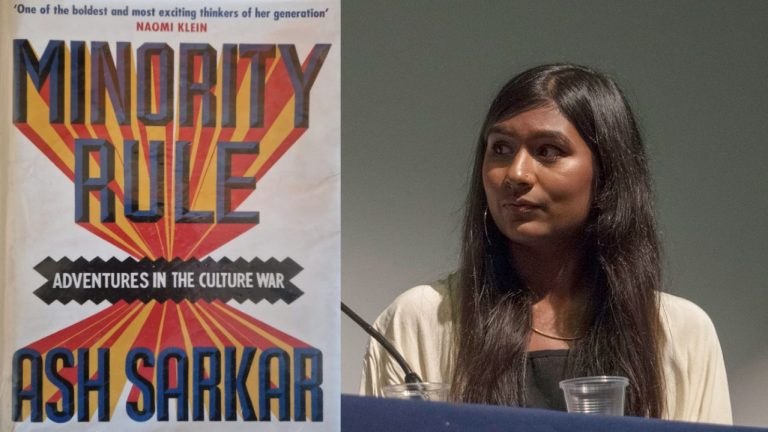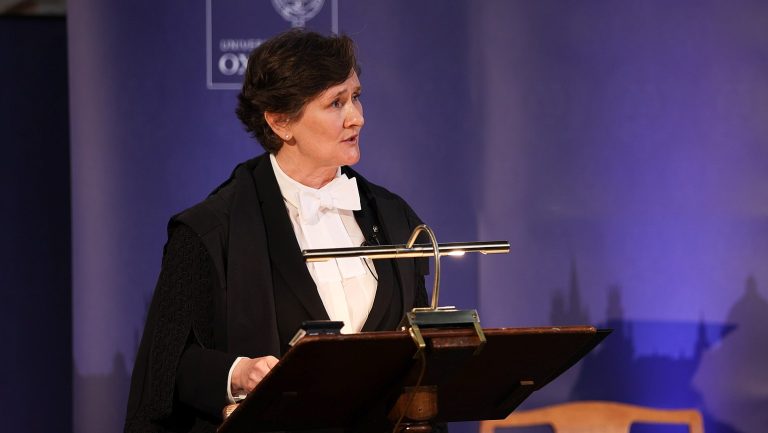Andy Beckett is a British journalist and historian. He studied Modern History at Balliol College from 1989 to 1992, and has since written several books and contributed to The Guardian, The London Review of Books, and The New York Times. His work often examines how the politics of the 1970s and 1980s shaped contemporary Britain.
(And, for the record, despite appearances on the page, Andy and I are not related – we just share a common surname, which we bravely put aside to have what I found to be a fascinating conversation about the problems and divides shaping modern Britain)
Cherwell: In When the Lights Went Out, you describe seeing Ted Heath return to Balliol for a Gaudy [reunion dinner]. The college has deep ties to postwar British politics. Did that play any role in your decision to study there?
Beckett: When I applied to Balliol, I didn’t know about all the connections to post-war prime ministers. But I did know it was a political college, which appealed to me, because at 18 or 19 I was becoming quite political. The idea of a college where politics was a big thing, and where some of the more elaborate Oxford rituals mattered less, was appealing.
Cherwell: Were your political sympathies already formed before university, or did Oxford shape them?
Beckett: When I arrived, I was left-of-centre but not in a thoughtful or defined way. I’d been a scholarship boy, a bit of a rebel, but ready for new ideas. Meeting other political students mattered. Studying modern history mattered too – European fascism, the New Deal – and the way history was taught at Balliol leaned toward politics: elites, class structure, social forces.
The end of Thatcherism was also important. We all went on the poll tax march in 1990; when Thatcher was toppled later that year, we celebrated. So, if you were left-wing, it felt like a time when the big enemy was crumbling. It didn’t feel futile.
There were also influential people around: Andrew Graham teaching PPE – associated with Labour governments; Yvette Cooper and James Purnell in student politics – people clearly headed for political careers. Politics pervaded the place.
Cherwell: You’ve said that while many of your peers moved into politics or policy, you took a different path into journalism. When did journalism first become a serious career consideration for you, and what were your initial steps after graduation?
Beckett: I started doing some journalism at school – the school newspaper – and I enjoyed it. At Oxford I didn’t write for Cherwell or Isis; in a slightly rebellious way, I avoided the establishment papers. In 1990, some people at Magdalen set up a new student paper called The Word using early Apple computers and desktop publishing. We ran the whole enterprise – pages, ads – and I wrote a lot, edited it for a time, and mostly wrote about culture: music and film. That experience made journalism feel exciting.
A lot of people at Oxford wanted to go straight to The Guardian, but I wanted to differentiate myself. I went to Berkeley, in California, for a journalism master’s after Oxford – partly to learn a different tradition and have something distinctive to offer on my return. That was my route into professional journalism.
Cherwell: In your most recent book, The Searchers, you follow five politicians pursuing a fairer, socialist vision of Britain. What do you recall from following their careers in real time, and did you hope their projects would succeed?
Beckett: I was left-of-centre at Oxford but became more left-wing later. Initially, I thought Tony Blair was charismatic but perhaps impractical; as I aged and as Britain changed in ways leftists disliked, I became more drawn to more radical figures.
Living in London, in Hackney, Diane Abbott’s constituency – and previously in Jeremy Corbyn’s constituency of Islington North – I’ve been aware of these figures. Ken Livingstone’s impact on London has been enormous – public transport, diversity, a rebellious egalitarian feel – and that practical-minded left-wingness attracted me. Corbyn’s project took me longer to appreciate; by 2016–17, when he had momentum, I began to see serious thinking around John McDonnell about reshaping the economy. That convinced me Corbynism wasn’t just elderly lefties taking over but a serious project worth exploring.
The book explores how political establishments react to radicals, and the hostility Corbyn, McDonnell, Abbott, Benn and Livingstone faced – which tells you as much about their opponents as about them.
Cherwell: You accept that their projects were generally unsuccessful. In terms of the causes of this failure, how do you weigh internal divisions in the Labour Party versus external forces like the establishment media and even the security state?
Beckett: Internal divisions are very important. Labour contains many traditions, and when the left gains power, the right of the party often finds that unacceptable. Corbyn’s leadership was undermined internally; Tony Benn faced undermining too. So internal splits matter.
External forces matter hugely as well. Since the 1970s, Britain has become more unequal; many benefited from privatisation, housing booms, weakened unions. Challenging that creates powerful opponents in the media, civil service, security services, and corporations. The Financial Times’ hostile coverage of Corbyn and McDonnell was revealing – even sophisticated business press showed visceral hostility.
Also, the left has made big mistakes – Benn was too optimistic about electoral chances, and Corbyn had limits as a Labour leader. So both internal errors and external opposition shaped outcomes. I often compare radicals of the left to Thatcherism: radicals on the right often get an easier ride because more interests are on their side. Thatcher, despite her radicalism, had establishment support; Benn did not. That informs my writing about the left.
Cherwell: Electoral evidence suggests that many of the broad, cross-class coalitions you discuss in The Searchers are harder to sustain today, even in London, where such alliances have historically been strongest. In light of this, do you think the contemporary left is struggling to attract working-class voters who feel culturally distant from its dominant forms of activism, and what do you see as the main barriers to deeper working-class participation?
Beckett: London has long been unusual in sustaining a broad cross-class coalition, with middle- and working-class voters often backing the same party. That reflects the city’s multiracial working class and a strong tradition of anti-racist organising, which has brought white middle-class activists and working-class Londoners of colour into shared political work. This history has helped figures such as Jeremy Corbyn maintain credibility across groups, so class-based political fragmentation has been less pronounced in London than elsewhere.
Outside the big cities, however, the left does face difficulties. Older working-class voters in towns and small cities can feel culturally distant from a more socially liberal left, and many of these areas have aged as younger people have moved away. Rising home ownership among older working-class voters has reinforced this shift, contributing to realignments, such as with the Red Wall’s move towards Boris in 2019. Still, it is misleading to treat the working class as uniformly white and socially conservative: in many urban areas, it is increasingly diverse and continues to support left-of-centre parties.
The main barriers to deeper working-class participation, then, lie in cultural distance and demographic change, especially in ageing, post-industrial areas, rather than in a uniform estrangement from the contemporary left.
Cherwell: I guess I can identify two – probably oversimplistic – accounts that try to explain the left’s recent difficulties when attempting to build these coalitions: New Labour’s retreat from economic egalitarianism, and identity politics diverting attention from economic concerns. Do you prefer one explanation or find them both too narrow?
Beckett: Both are important. New Labour’s move away from talking about class and economic competition helped it win power but eroded its base: poorer areas voted less for New Labour over time, especially in the north. Even in the 2000s, many people felt left behind despite overall growth.
Corbynism in 2017 offered a populist left economic analysis – elites vs everyone else – that resonated briefly. The left has often avoided talking sufficiently about inequality over the last 20–30 years; when it does, it tends to resonate. Public opinion has fluctuated – recently, there’s been more hostility to inequality and corporations, and many voters now give increasingly left-wing answers on economic questions.
On identity politics, when it first rose in Britain – notably with Ken Livingstone in the GLC – it complemented class analysis by acknowledging other forms of inequality. Problems arise when identity politics detaches from economic analysis. In Britain, identity activism often coexists with economic concerns; there is less separation than is sometimes seen in America.
Criticisms that identity politics ignores economic issues can be a straw man. But identity-focused debates can be exploited by the right to magnify niche issues and paint the left as out of touch – that’s a strategic move by opponents.
Cherwell: Are you suggesting that the right has been able to weaponise identity-focused debates in ways that distance socially conservative voters from the left?
Beckett: Absolutely. Social change movements often begin with small minorities; exposing them to early mass democratic debate can be risky, as unfamiliar majorities can reject them. Over time, social attitudes shift – for example, on gay civil partnerships – but decades of being labelled extremist often come first. The right uses conservatism and fear of niche causes to attack the left; over time, some of those once-minority positions become mainstream, but the transition can be rocky.
Cherwell: I suppose Zack Polanski is one of the few figures on the left currently finding success by largely sidestepping ‘culture war’ debates and focusing on economic issues, though his recent appearance on The Rest Is Politics suggested he can struggle with economic detail. Is that a weakness of the modern Green or left movement? How do they overcome it?
Beckett: Knowing figures matters. Left economic populism can be powerful, but leaders need to be well-briefed and know the numbers when challenged. Mamdani in New York was effective because he knew the figures; newcomers risk being undone by centrist interviewers exposing gaps.
Media framing matters too. Radicals are often framed as risky, while right-wing radicals are not framed the same way. The left must show its proposals are practical, and often that radical reforms are actually the stabilising choice, given the crises we are facing – climate and public services. The left should also demand solutions from centrists, who often accept the problems identified by the left, like growing wealth inequality, but shy away from bolder proposals.
Cherwell: Do you share centrist worries about a potential bond market revolt, or are these fears overstated?
Beckett: Worries about a bond market revolt are reasonable. It is simply more expensive for governments to borrow than it was five or ten years ago, and many are trying to borrow large sums at the same time. The bond market, therefore, has more power than before, which is an unavoidable reality.
But the way the bond market frames its own demands is often quite limited. In Britain, for example, traders might say they want the government to raise taxes, yet if higher taxes slow growth, revenues fall, and borrowing may have to rise anyway. There is a short-term belief that balancing the books now produces stability, even though prioritising that over several years could leave the country with weakened public services, higher poverty, and, ultimately, a more unstable economy.
So, the bond market cannot be ignored, but its assumptions should be questioned. Sometimes a left-wing approach is actually the more stable option in the medium term, even if markets instinctively favour right-wing solutions. Britain’s last decade of chaotic Conservative governments, followed by a fairly right-wing Labour stance, has not delivered the stable, fast-growing economy the markets claim to prefer, which shows that their orthodox instincts are not always borne out in practice
Cherwell: Looking ahead to the next general election, how do you see party fragmentation shaping the outcome? And how does Rachel Reeves’s budget fit into these dynamics?
Beckett: Party support is fragmented to an unprecedented degree. Aside from Reform, several parties are clustered at similar levels, which points towards a quasi-European result with no overall majority and multiple parties on 15–20 percent. That would almost certainly mean coalition negotiations on both sides – a major shock for a political system built around single-party rule.
Labour could recover somewhat, but from its current polling position, it looks unlikely to win outright or even be the largest party, without a deal. It may need to negotiate with the Liberal Democrats, the Greens, and smaller groups to assemble a two- or three-party coalition. Reform’s support could soften if leadership controversies persist, while the Conservatives risk being eclipsed if they edge towards a Reform coalition.
Reeves’s budget illustrates Labour’s difficulty. The individual measures – such as the mansion tax – poll well, but the overall package is viewed negatively because voters sense an unresolved contradiction: Labour is trying to deliver progressive reforms while accepting restrictive economic framings about balanced books. That muddled message damages credibility and complicates any recovery. All this interacts with an electoral system ill-suited to fragmentation, where similar vote shares could translate into wildly unequal seat counts. Some parties may gain large national votes while winning few seats, leaving almost everyone dissatisfied. There are early signs parties are adjusting to this reality – Labour tilting left, figures adopting more consensual tones – but Britain’s majoritarian mindset is only just beginning to adapt to a more European-style political landscape.
















